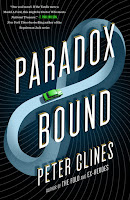Despite the pandemic, there’s still been a lot of fantastic storytelling going on. Books. Movies. TV shows. Some of it’s been fun, some of it nostalgic, some of it… well, let’s be honest, some of it was greatly delayed because of said pandemic. Regardless there’s been a lot of enjoyable stuff.
BUT…
As Uncle Ben taught us, with great storytelling comes great spoilers.
As I’m sure you know, spoilers are a matter of great contention. Is it my fault or your fault if I post spoilers to something and you see them? How much time has to pass before spoilers are acceptable? Does getting them really affect my enjoyment of the story? Do spoilers even matter?
I’ve talked about (and in some cases, argued about) all these before, here and on the wider internet. But it’s that last one I wanted to blather on about today. Specifically, a certain angle some folks take with it you may have seen. It goes something like this…
”If knowing a spoiler ruins your story… maybe your story’s not that good.”
This one always makes me grind my teeth. Partly because it’s kind of an inherently smug thing to say, but also because it shows a basic misunderstanding of storytelling. Which is why it’s doubly annoying when I see it from… well, storytellers.
So let’s talk about narrative structure for a few minutes.
I’ve talked about this before at length, so I won’t do too much here (hit that link if you want a lot more). For our immediate purposes, narrative structure’s the order I’ve decided my plot points and character elements need to follow. It’s the sequence I want my audience to receive information in so they’ll get a certain dramatic effect. Simply put, narrative structure is the way I’ve chosen to tell my story.
If I want to tell my story in a straight A-to-Z fashion, that’s my narrative choice. If I want to use a bunch of flashbacks, that’s also up to me as the storyteller. Heck, if I decide to go completely nonlinear and change timeframes every other page without any apparent rhyme or reason… I mean, that’s my call. I’m the one telling the story and I (hopefully) have solid reasons for why I’m telling it in this specific way.
But whichever way I do it—assuming I do have a reason and I’m not just skipping around wildly because I thought it’d be cool—I’ve made a specific choice for my audience to get this piece of information first, this one second, this one third, and so on and so forth up to my five hundred and fortieth piece of information.
Yes, all real novels contain exactly five hundred and forty elements. No more, no less, just as Plato said in his many treatise on storytelling.
Anyway…
Now, that order’s important because my narrative structure is one of the thing that defines my story. If I put them in a different order, it’s a different story. That makes sense, right? An example I’ve used before is The Sixth Sense. If you’ve never seen it before and somehow avoided hearing about it… well, first off, seriously, good for you. Go see it right now. Go! Now! I can’t believe you’ve made it this long. And I’m about to spoil it, so please don’t keep reading.
Did you go away?
Okay, spoiler-filled explanation…
The Sixth Sense is the skin-crawling story of child psychologist named Malcolm who’s trying to treat a little boy named Cole. Cole’s haunted by ghosts that only he can see, which leaves him constantly traumatized and in shock. Malcolm helps Cole realize the ghosts are, in their own way, equally scared and asking for help. And as Cole begins to understand that his powers are a gift, not a curse, Malcolm comes to realize that he’s a ghost—that he died over a year ago in an encounter we saw at the start of the movie.
What’s great, though, is that—like I said up above—if you watch the movie a second time (or if someone spoils the twist for you), it becomes a very different story. In fact, knowing the truth about Malcolm and the other ghosts, the story becomes less scary and much more tragic. Almost goofy at points. Now it’s a story about a kid and his ghost friends solving mysteries. It’s pretty much Paranorman.
That’s the key thing here—The Sixth Sense becomes a differentstory. Not the one Shyamalan intended for us to see. Definitely not the one he narratively structured. The audience learning the truth about Malcolm is intended to be element five hundred and nine, not element one that we knew before we even sat down. Knowing the big twist changes it into a different story.
So the whole “…maybe your story’s not that good” argument doesn’t make a lot of sense, because if I see a bunch of spoilers it means I haven’t seenyour story. I saw a different story that had all the same elements, but in a different order and thus with different dramatic weights. It had a completely different narrative structure. I got Paranorman, not The Sixth Sense. Not that there’s anything wrong with Paranorman (I love it) but… it’s not the initial experience Shyamalan was trying to create for us.
Now, there’s another, related point we can make here. By their nature, spoilers tend to be some kind of reveal. It’s a piece of unknown or unexpected information. Maybe it’s a cool twist. Maybe it’s the identity of the murderer. Maybe it’s just a little cameo/ crossover beat. And sometimes, once that information’s been revealed, we realize this story didn’t have much else going for it. Once we know who the murderer is, we realize it was our own desire to know the answer carrying us through the story, not really the story itself. The story’s not flawed, it’s just… well, also not that great in any way.
Or maybe the answer just wasn’t quite worth the build up. Maybe the murderer turns out to be… well, exactly who we thought it was. Or someone we absolutely never could have considered (“Chris? Who the hell is Chris?”). Maybe the big twist happens and it… doesn’t make a lot of sense? Maybe it doesn’t change anything or doesn’t mean anything (“Chris is actually Pat’s long lost cousin? Well who the hell is Pat?”). In these cases the story beat might land with some impact in the moment, but not so much after the fact.
And, yeah, these stories have problems. I mean, a twist by its very nature should sort of retroactively rewrite large swaths of my story. If it doesn’t do that… well, that means I screwed up. If my flashback doesn’t make linear sense within my story, then I’ve done something wrong. My reveals aren’t doing what they’re supposed to do.
But problems with something flawed doesn’t mean the principle is flawed. I can’t say narrative structure doesn’t matter because a couple stories have crappy narrative structure. That’s like saying all sushi is bad because I bought sushi at a gas station once and it made me sick. Or, y’know, that Sharknado5: Global Swarming has a dumb twist that doesn’t change anything, therefore I can give away a bunch of stuff from Shang-Chi and the Legend of the Ten Rings.
I mean, maybe it’s just me, but that doesn’t seem to make a lot of sense…
Yes, a really good story will still work once you know the big reveal. That’s why there are books we like to re-read and movies we watch three or four times. The storytellers were very careful to make sure their narrative would still work even when it was forced to switch tracks because we knew things. But that doesn’t mean they didn’t want us to see the original story they planned out.
I know in my own writing I love having a good twists and reveals. Things that’ll make people sit up and go “WhaaaaaaaaaaaaaaAAAAATTT???” or maybe even shriek a favorite curse word or two. And I try very, very hard to make sure my books hold up on a second reading, that you’ll catch the little clues and maybe even realize I left some things sitting out in plain sight for you to catch on your second or third read, so that other story is still a fun one for you.
(like page 115 of Paradox Bound, for example. I don’t think anyone’s caught that. Not many people, anyway)
But that’s not the story I want you to read first. There’s a reason I put these things on page one and not page fifty, those things on page one hundred and not on page one, and why I was slightly vague about that so it’d be right where it was supposed to be… but you wouldn’t register what it was until a second or third time through. Because this is the effect I’m trying to create, not that.
And the awful thing about spoilers is they make sure someone can never read this story. It’s almost impossible to unlearn something, so that experience gets lost forever. They never get to read thisstory… only that one.
And that’s a shame.
Again, as I mentioned above, still many issues about spoilers past this one. But hopefully—for now, at least—we’ve put the “do they even matter” question to rest. And also the “maybe your story’s not that good” defense of them.
Also-also, that Plato thing about halfway through was a joke. Please put that to rest too. In fact, forget it, just to be safe. Wipe it from your mental hard drive.
Next time…
I’ve got to be honest, I’m juggling four different projects right now and (at the moment) none of them have inspired a ranty blog post. So next week may just be some random cartoons or something unless any of you has a pressing question you’d like me to blather on about.
Until then… go write.







0 replies on “When I SAY You Can Know It”
Do you think debut novels are forced to have a simpler narrative style to attract an agent?
For instance, in the Way of Kings series there are pages long explanations of world mechanics, which I actually enjoy. There is a very large cast of perspective characters as well. It has had 3 protagonists at the same time. This breaks all the rules of "what agents are looking for" as I understand them but Brandon Sanderson seems to have no trouble getting books out.
Now that I'm going through editing rewrite passes that content is specifically the sort of stuff that is getting cut. Are the rules different once an audience accepts an author's style?
I had an idea for short (max 300 word) "discovered" encyclopedia entries at key points, but that's just right out the door now.
Thanks. This post is has good explanations of why I've come to dislike watching lots of trailers before seeing a movie. Usually they aren't as bad The Sixth Sense being spoiled before a first viewing, but I sometimes feel the movie was "flat" due to knowing to much ahead of time.